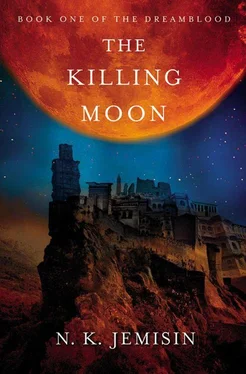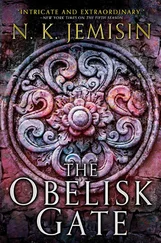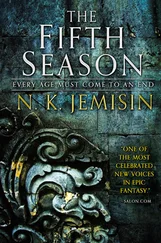So Nijiri swept at Harakha’s ankles with first one leg and then the other, rolling on his forearms to execute the sweeps again and again, forcing Harakha to dance back. The other Sentinels quickly altered their formation to avoid Nijiri’s whirling legs and to keep from tripping over each other—just as Nijiri had hoped. Then, when Harakha grew justifiably annoyed and angled a stabbing strike at Nijiri’s head, Nijiri closed his legs and rolled— toward Harakha. This brought him under Harakha’s stick; the tip struck the ground beyond Nijiri and lodged, just for an instant, in the sand. At this Nijiri kicked up, aiming for Harakha’s hand. He did not score, for Harakha realized what he was doing at the last instant and jerked back, retaliating with a furious kick that Nijiri bore with a grunt as he rolled away. A small pain-price to pay, for he had achieved his goal: Harakha stumbled back a step more, overcompensating in typical fashion for the fact that he’d almost lost his weapon. This forced the other three Sentinels to move more , gracelessly, to avoid their clumsy younger brother.
Distraction was a Gatherer’s beloved friend. Rolling to his hands and toes, Nijiri darted forward and slapped his hand against Mekhi’s calf. It was hard to find the soul from a limb, and harder for Nijiri to cool his thoughts enough for narcomancy, but perhaps—
Mekhi stumbled and fell to the ground, groaning. He was only groggy, but from an awake, aware man whose blood was fired for battle, Nijiri could expect nothing better. When Mekhi went down, however, Harakha hissed and nearly tripped over Mekhi’s stick. Nijiri rose behind him like a shadow, and too late Harakha realized the danger. By that point Nijiri had touched two fingers to the nape of his neck, sending dreambile coursing along his spine like cold water to numb everything it touched. Harakha was unconscious even as his body whipped around. He kept spinning until he hit the ground, hard enough that he would no doubt curse Nijiri for his bruises when he woke.
Delighted, Nijiri rounded on Mekhi, who was trying to stumble away until his sleep-mazed mind could clear. Forking his fingers and humming the song of his jungissa, Nijiri lunged after him—
—Only to halt, statue-still, as the tip of a stick came to hover before his face. Another stick, light as the touch of a lover, came to rest on the small of his back.
It was only a sparring match, he reminded himself in an effort to summon calm. (It did not come.) Only a test… but he had seen Sentinels impale men using sheer strength and angles to make their blunt sticks sharp as glass-tipped spears. And Andat liked to leave flesh wounds whenever he felt Nijiri had not fought to his fullest effort, as an encouragement to greater diligence.
“Good,” said Andat, who held the stick to his face. That meant the one behind him was Sentinel Inefer. He had bested two, but been caught by the two most experienced. Had that been enough to pass the test? I should have left Mekhi; he was no threat. Should have gotten one of the others first, should have—
“ Very good,” Andat amended, and with relief Nijiri realized the man was truly pleased. “Two of us, with you unarmed and all of us ready? I would have been satisfied if you’d gotten one.”
“It would’ve been Harakha, regardless,” said Inefer behind Nijiri, sounding disgusted. “Blundering, peaceless fool.”
“We’ll drill him until he learns better,” Andat said easily, and in spite of himself Nijiri grimaced in sympathy.
Nijiri felt Inefer’s stick leave his back. “Other matters take precedence for now,” Andat said, looking up at the balcony that overhung the sparring circle. Nijiri followed Andat’s gaze and tensed in fresh dread, for there, gazing down at them with a wry expression, stood the Superior of the Hetawa. Beside the Superior stood two men in sleeveless, hooded robes of loose off-white linen. He could see nothing of their faces, and the angle was wrong to glimpse their shoulder tattoos, but he knew their builds well enough to guess which was which—and which, since a third man should have been among them, was missing.
Suppressing a frown, Nijiri got to his feet so that he could raise his hands in proper salute toward his brethren.
“That should do, I think,” said the Superior. “Sentinel Andat, are you satisfied?”
“I am,” said Andat, “and I speak for my pathbrethren in this. Anyone who can beat two Sentinels out of four has more than sufficient skill to carry out the Goddess’s will beyond the Hetawa’s walls.” He glanced at Nijiri and smiled. “Even if he chooses to follow the wrong path in the process. Alas.”
“I see. Thank you, Andat.” The Superior’s dark eyes settled on Nijiri then, and privately Nijiri fought the urge to cover himself or apologize for his unpeaceful appearance. He was still out of breath, drenched in sweat and dressed only in a loincloth, and it felt as though his heart had made a dancing-drum of his sternum. But he had done well; he had no reason for shame.
“Come then, Acolyte Nijiri,” the Superior said—and paused, amusement narrowing his dark eyes. “Acolyte for now, at least.”
Nijiri tried not to grin, and failed utterly.
“Go and wash,” the Superior continued, emphasizing the latter word enough that some of Nijiri’s joy turned to embarrassment. “At the sunset hour, come to the Hall of Blessings.” To take your Gatherers’ Oath, he did not say, but Nijiri heard it anyhow, and rejoiced anew. Then the Superior turned away, heading through the balcony hanging into his offices. Silently, the two hooded men flanking him followed.
“That was quick,” muttered Mekhi, who grimaced and rubbed the back of his neck as he joined them. He still moved stiffly, shaking his free arm as if the hand had gone to sleep. Nijiri lifted his hand, flat with palm down, and bowed over it in contrition; Mekhi waved this off.
“A love match on both sides, I think,” said Andat, though he also made an apologetic gesture when his brothers looked at him, so no one would think him resentful. “Go on, then, boy. Congratulations.”
The word made it real. With a delighted grin, Nijiri bobbed a barely courteous nod to all three men, then turned and walked—with a speed just shy of running—into the Hetawa’s dim silence.
* * *
The bath restored his spirits, and the cool water was a balm after the sparring match in sweltering afternoon heat. No one else was in the bathing chamber when Nijiri used it, though once he returned to the small cell that he shared with three other acolytes he found that word had somehow spread: a four of pathing gifts had been left on his pallet. The first was a small, prettily enameled mirror, which had probably come from his roommates—yes, that was Talipa’s work on the flowers, he would recognize it anywhere. Talipa had been claimed from a potter family. The second gift was a small set of finger-cuffs, engraved with formal prayer pictorals. Beautiful work, and probably that of Moramal, the acolyte-master. Nijiri set this aside. As a Gatherer he would need some jewelry, for a Gatherer went disguised among the faithful—but it was still not a gift that would see much use. Alas.
The third was a small jar of scented oil, which he sniffed and nearly dropped in amazement. Myrrh; could it be? But there was no mistaking the fragrance. Such an expensive gift could only have come from his soon-to-be pathbrothers. And that, no doubt, had been how the other acolytes guessed the news; one of them would’ve been dispatched to bring the gift to Nijiri’s cell, and that one had apparently gossiped the whole way. Nijiri grinned to himself.
The fourth gift was a tiny statue of the Sun in his human form, carved in darkwood and polished to a fine gloss, right down to the prominent erect penis that any Sun statue bore. A popular gift between lovers.
Читать дальше












